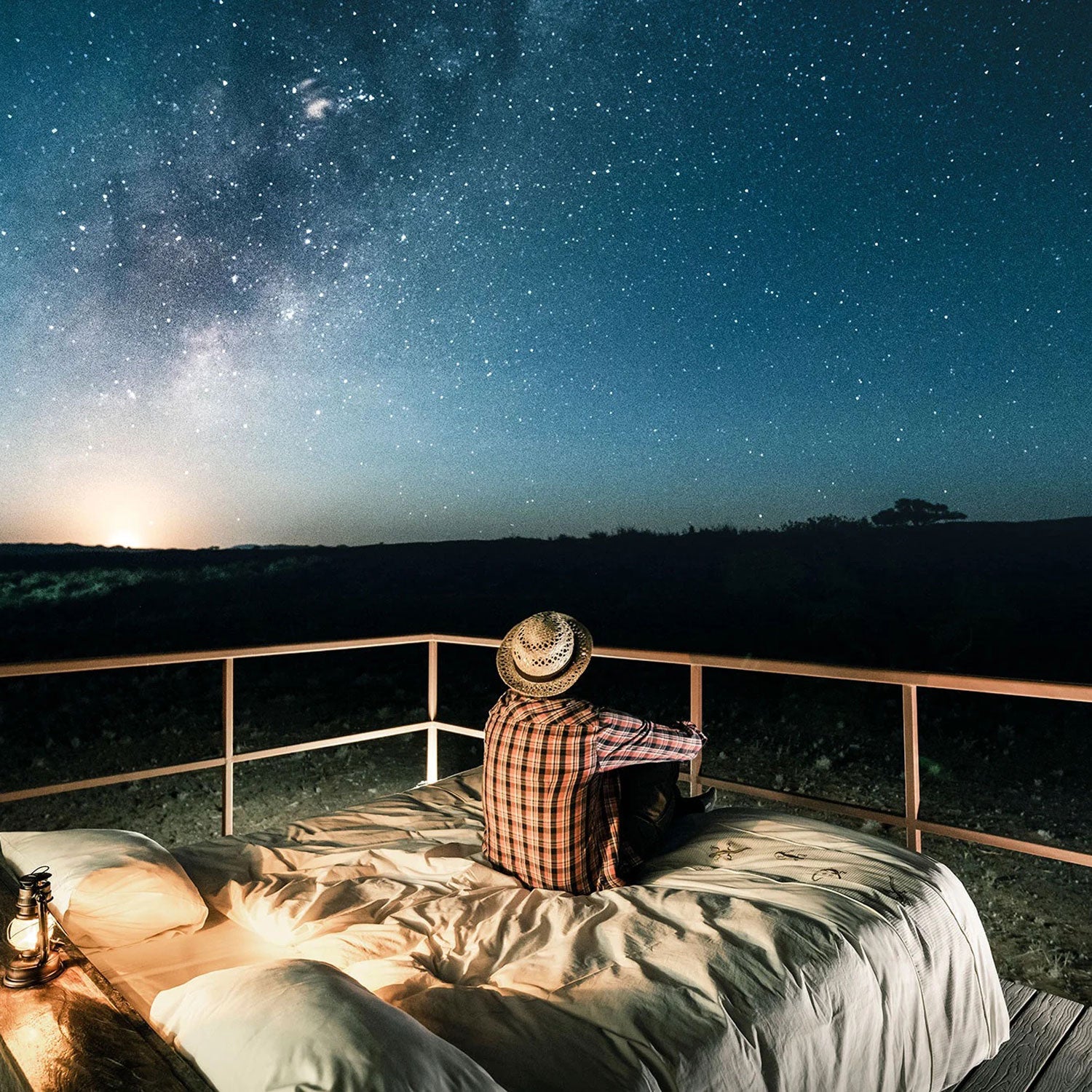I never expected to destress from double-postponing my wedding by staring into space, yet there I was, spying on the heavens from my backyard in light-polluted Cleveland for the umpteenth night in a row.
“That one’s Jupiter,” I whispered to my dog, Harry, who’d come to expect this backyard astronomy ritual. We were months into the pandemic and my now-husband, Frank, and I had spent the evening finalizing an email to alert friends and family that, yet again, we’d delayed our wedding due to spiking COVID-19 transmissions. Pairing this stress with the questionable status of my career—how can I be a travel writer without, well, traveling?—plus Frank’s front-line emergency physician job had my stomach in neverending knots. But the tension slackened each night as I sprawled beneath the stars, letting my mind recall those old Astronomy 101 lessons from college—particularly the vastness of the universe, and just how tiny my problems felt within it.
While life has returned to normal, I still turn to the cosmos for stress relief today—and I’m not the only one. Mindful stargazing, an activity that harnesses the mental health benefits of watching the night sky, is an emerging wellness practice. For instance, the Office of Astronomy for Development (OAD), a facet of the International Astronomical Union that furthers the use of astronomy for sustainable development, mental health, and cultural preservation, funds numerous projects to bring astronomy’s therapeutic effects to vulnerable groups, such as refugees. In tourism, hotels from Iceland to the Maldives have adopted programming that harnesses these same benefits for wellness travelers.
“When we feel stressed and anxious, physically our vision narrows; we get caught in our own problems, and they can feel very big,” says Mark Westmoquette, an astrophysicist and Zen teacher who leads mindful stargazing retreats and in partnership with OAD.
Our pupils actually get wider when we look at the dark night sky. “When we look with wide eyes and connect with the stars, this gives you a broader perspective which helps us both physically and mentally relax,” Westmoquette says.
As a self-identified “astrotourist,” my idea of stargazing has long involved traveling to international dark sky places where a jewelry box of constellations, planets, and nebulae gives dramatic perspective on my small place in the universe. While these experiences, from scouting auroras from sheep farms in South Greenland to navigating grief�� beneath the Milky Way while climbing Mount Kilimanjaro, will always be my favorite night-sky adventures, the pandemic opened my eyes to the healing power of mindful stargazing from my home city—even if light pollution obscures all but a handful of stars and planets each night.
“Seeing just one star and appreciating that��its light has traveled across the vastness of space for centuries just to meet your eye and be seen and known in this moment is magical,” says Westmoquette. “Bathing in the light of the moon and considering our relationship to it is something anyone can do.”
How to Get into Backyard Astronomy
While some stargazers have created enviable at-home observatories, I keep my backyard astronomy simple. I grab a pair of binoculars, a towel, my iPhone, and (of course) my dog, then lie on the grass and stare at the sky—sometimes in search of curious space sights, other times to simply unwind beneath the stars. Here’s how to partake, too.
Find Bright Night-Sky Objects
If you live in or near a dark-sky place, consider yourself lucky. Light pollution plagues the majority of us; nearly of Northern Americans (like me) can’t see the Milky Way from their home. That said, we can see some objects, even in light-polluted skies. That’s where I focus my backyard astronomy sessions.
According to Matt Hjelle, marketing director for stargazing app Sky Safari, we can spot nearby planets and major stars, as well as deep-sky objects—those outside the bounds of our solar system—with the naked eye. This includes the Andromeda galaxy, Orion nebula, and Pleiades star cluster, depending on the season.
Download a Stargazing App
Locating these space marvels can take a bit of know-how, especially for beginners. I use Sky Safari, one of several sophisticated stargazing apps, with augmented reality to navigate what’s overhead. I also look to the future to bookmark exciting night-sky events—like the conjunction of two planets, or a planetary parade (when multiple planets dot the sky on the same night).
Beyond navigating the night sky, I also use my stargazing app to learn more about the observable objects. For example, a deep dive into the visible Andromeda galaxy shares that this spiral wonder may collide with our home galaxy, the Milky Way, in several billion years. Clicking on Jupiter in my stargazing app tells me its diameter is 11 times larger than Earth’s. Said differently: if we’re a nickel, this gas giant would be a basketball. It’s hard not to find grounding in this perspective.
Let Your Eyes Adjust to the Dark
The better your eyes are adjusted to the dark, which can take 20 to 30 minutes, the better you’ll see the night sky. To stay tuned into the night, turn off your phone—or use —and shutter your outdoor lights. Many stargazing apps also offer a red-light mode, so you can learn about the sky wonders without compromising vision.
Unplug, Then Unwind
During some backyard astronomy nights, I use either the stargazing apps or NASA’s website (with red-light mode activated) to binge perspective-shifting intel—like the fact our solar system is just one of the Milky Way galaxy’s nearly 4,000 known planetary systems. Other nights, particularly after stressful days, I ditch my phone and binoculars and let myself bathe in the magic overhead.
According to Westmoquette, this is the best way to enjoy stargazing’s mental health benefits. “We need to put down the tech and put aside all the theories and concepts that wind us up and actually disconnect us from the present-moment experience,” he says. “Immersing ourselves in the moment helps us let go of the whir of thoughts and to-do lists and start appreciating the beauty and wonder of the night sky. That’s what supports good mental health.”

Stephanie Vermillion��is an adventure and astrotourism writer and author of the upcoming National Geographic book��, out December 3.


